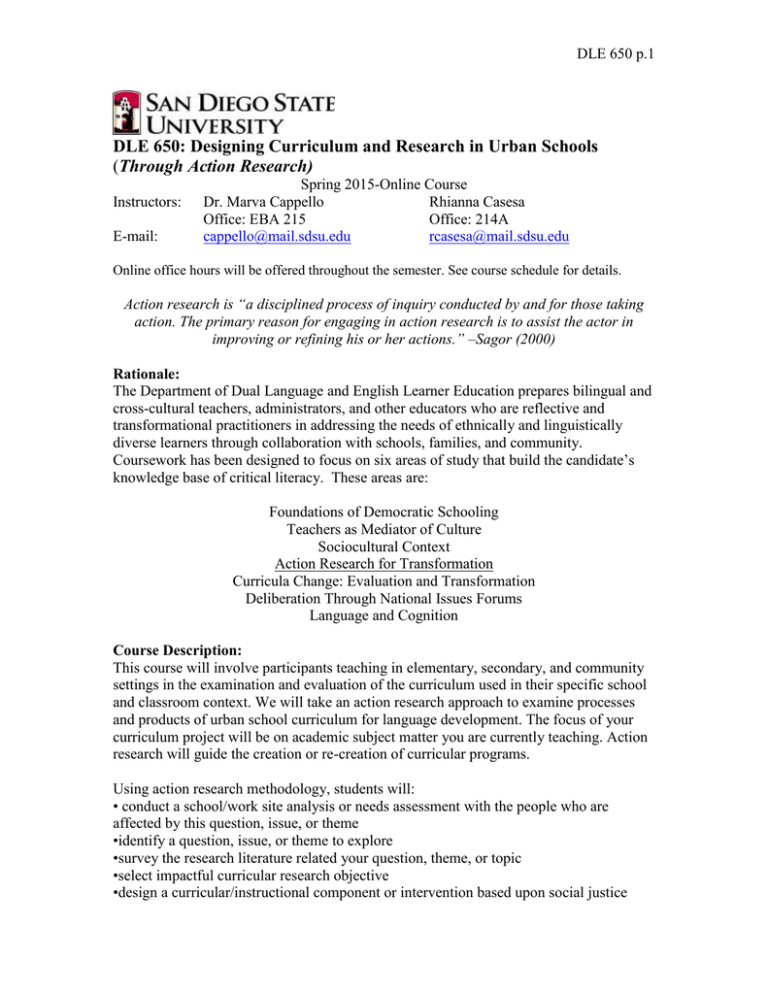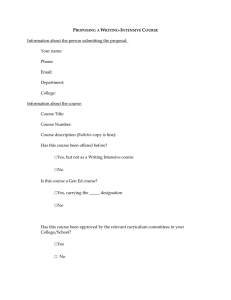DLE 650: Designing Curriculum and Research in Urban Schools
advertisement

DLE 650 p.1 DLE 650: Designing Curriculum and Research in Urban Schools (Through Action Research) Instructors: E-mail: Spring 2015-Online Course Dr. Marva Cappello Rhianna Casesa Office: EBA 215 Office: 214A cappello@mail.sdsu.edu rcasesa@mail.sdsu.edu Online office hours will be offered throughout the semester. See course schedule for details. Action research is “a disciplined process of inquiry conducted by and for those taking action. The primary reason for engaging in action research is to assist the actor in improving or refining his or her actions.” –Sagor (2000) Rationale: The Department of Dual Language and English Learner Education prepares bilingual and cross-cultural teachers, administrators, and other educators who are reflective and transformational practitioners in addressing the needs of ethnically and linguistically diverse learners through collaboration with schools, families, and community. Coursework has been designed to focus on six areas of study that build the candidate’s knowledge base of critical literacy. These areas are: Foundations of Democratic Schooling Teachers as Mediator of Culture Sociocultural Context Action Research for Transformation Curricula Change: Evaluation and Transformation Deliberation Through National Issues Forums Language and Cognition Course Description: This course will involve participants teaching in elementary, secondary, and community settings in the examination and evaluation of the curriculum used in their specific school and classroom context. We will take an action research approach to examine processes and products of urban school curriculum for language development. The focus of your curriculum project will be on academic subject matter you are currently teaching. Action research will guide the creation or re-creation of curricular programs. Using action research methodology, students will: • conduct a school/work site analysis or needs assessment with the people who are affected by this question, issue, or theme •identify a question, issue, or theme to explore •survey the research literature related your question, theme, or topic •select impactful curricular research objective •design a curricular/instructional component or intervention based upon social justice DLE 650 p.2 •generate data related to the invention •analyze and discuss findings The course is designed to model the teaching/learning process as described by Paulo Freire, known as problem-posing education. Briefly, this consists of: (1) experiences to initiate critical thinking about a problem, issue, or concern; (2) reflection on conditions; (3) conceptualization; (4) praxis (action through reflection); (5) internalization, or knowledge/action, to improve the social condition. Objectives: Throughout the course of study students will: 1. Identify features of and use problem-posing processes throughout the course of study; 2. Learn how to conduct a needs assessment/survey that includes the principal stakeholders in the selected community; 3. Operationalize the basic components of action research through a teacher-selected curriculum project; 4. Conduct a literature review as part of your action research project that includes an investigation of program model (context); 5. Design and evaluate a curricular program using the appropriate research methodologies; 6. Construct and present your curricular program in a manuscript prepared according to academic manuscript discourse; 7. Utilize and engage in online discussion forums as a reflective process for creating change. Texts: Falk, B. & Blumenreich, M. (2005). The power of questions: A guide to teacher and student research. Portsmouth, NH: Heinemann Many required readings and course materials are available on Blackboard. It is an essential element for your success in this course. Expectations: Professionalism and Participation. Your participation in this course demonstrates your commitment to the education field. Your understanding of the content and your participation in course activities with your peers are vital to your on-going learning. Your professionalism grade will be based upon class participation and preparation. Participation is required. Adherence to course timeline including timely involvement within the given module is expected and contributes to your professionalism/participation grade. Please inform us of extenuating circumstances BEFORE you fall behind. Be advised that you will be REQUIRED to attend one synchronous meeting this semester. Additional optional opportunities for synchronous participation during online office hours will also be offered. DLE 650 p.3 Course Assignments All assignments must be typed and double-spaced using 12-point font. Please use Times New Roman or similar font. Keep a copy of every assignment for your records. The quality of all written work is expected to be graduate level. Written work is evaluated for quality and clarity of content, logical organization, and general mechanics such as spelling and grammar. All assignments will be submitted electronically through Blackboard. Assignments are due by midnight on the date specified. Due dates are specified on the course calendar in this syllabus. Late papers will only be accepted with prior approval from the instructors. Assignments Descriptions This section includes all of the course work assigned including major projects and online modules. Proposal Outline 15% The purpose of the proposal is for you to outline your final paper and provide the instructors an opportunity to provide feedback. 1) Proposed Purposes and Research Questions: What specific questions will drive your action research? Why is your research important? How will it contribute to the field? 2) School Site Context: a) Analysis of data using the Context of Study Graphic Organizer as it pertains to your specific research site. b) A 1-2 page narrative that brings together your findings and articulates a context for your research. 3) Annotated Bibliography (for Literature Review): Reviewing the literature is an important part of conducting research. It will help you determine what has come before but also where there are gaps for you to generate new knowledge for yourself and others. You will review studies relative to your research in three areas: policy-related literature, theoretical literature, and existing research on your specific questions in 1-2 pages. The proposal will include an annotated bibliography of at least 8 references. 4) Methods Proposal: This 1-2 page proposal will describe the tools you will use for data generation and analysis in your research. Your school site survey is one tool among others needed to accomplish this goal. You will be required to triangulate your data by including at least three different data sets (ie: survey, student work, teacher interviews). 5) Feedback: You will be required to provide constructive feedback on ONE peer’s proposal outline through Peer Mark using Turn It In on our Blackboard course. DLE 650 p.4 Curriculum Action Research Paper 45% You will bring all your work together to create a manuscript of your action research project. This paper will elaborate and expand on the information provided in the proposal outline. Your curriculum driven study will include the following sections with the minimum page requirements: Abstract (150 words max) Introduction (including context, purpose(s), and research questions) (2 pages) Theoretical Framework (1 page including visual) Literature review (4 pages) Methods section (2 pages) Curricular Innovation (1 page) Results (2 pages) Discussion/reflection (2 pages) References (1 page) Your paper will conform to APA 6th Ed. format requirements. This final paper will need at least 15 pages to be complete. However, please limit your paper to a maximum of 20 pages. In addition, you will be required to provide constructive feedback on one peer’s manuscript through Peer Mark using Turn It In on our Blackboard course. Poster and Online Presentation 20% You will excerpt all of the key ideas from your Curriculum Action Research Paper and create an electronic academic poster highlighting your work. You will present your findings to classmates online during one of our two last classes. This session will serve as the final assessment for our course. You are required to participate in at least one synchronous meeting on either Tuesday, May 5, 2015 or Wednesday, May 6, 2015 from 5:00- 8:00 pm. Please plan accordingly. Discussion Board Reflective Posts 15% A major course requirement is active participation through discussion board posts. This is one way we can capitalize on the social nature of learning during our web-based educational experience. Students are required to: 1) Respond to the information in the module and the guided question posted in the discussion board forum. We anticipate your responses will be approximately 1-2 paragraphs long. Initial DB responses due Friday by midnight. 2) Respond to at least one of your classmates’ posts relating how your thoughts align or contradict their ideas. (Remember to use your best netiquette when posting.) Peer DB responses due Sunday by midnight. DLE 650 p.5 The professors will comment on the quality of student posts and give a score out of points for each forum based on the following: 1) original thoughts that demonstrate praxis, 2) depth of thought that carries the ideas further, and 3) significance of the information or ideas presented. Please refer to the rubric below. Rubric for Online Discussion of Reading Responses *3 = meets criteria Originality 2 3 1 2 3 1 2 3 Not a only a summary but highlights and amplifies particular ideas Creative responses Depth of Thought & Analysis 1 Carries the ideas of the reading further or adapt the idea in a classroom setting or other possible classroom contexts Makes connections to other ideas or theories. Maintains complex discussion without repetition over many paragraphs or sessions. Significance or Importance of the Information The ideas eventually lead to classroom application by you or others. Thoughts lead to greater social justice or higher quality or quantity of learning. 9 Total Requirement Professionalism/Participation Discussion Board Proposal Outline Final Action Research Paper Poster and Presentation % of grade 5% 15% 15% 45% 20% Total 100% Due Date ongoing ongoing 2/22/15 4/26/15 5/5 or 5/6/15 Please note: No work (revisions) will be accepted after May 10, 2015. Evaluation: Points will be awarded for each assignment as mentioned above. No late work will be accepted unless arranged with the instructors in advance of the due date. Late assignments will have grades negatively impacted. Grading scale is shown below: DLE 650 p.6 A AB+ B BC 92-100 90-91 85-89 80-84 75-79 Below 74 We will not use a curve to grade. Everyone in this class has the potential to earn an A for the course! Netiquette: There is a social code for participation on the internet. Even though our course is web-based, there is still a social expectation for learning. Our goal is to have a rigorous and exciting exchange of information, in the context of supportive dialogue. Always be respectful of other students and the instructor. This includes using polite language and showing tolerance of the views of others, even when you disagree with them during chat sessions or postings. For general guidelines see a guide to netiquette (www.albion.com/netiquette/book/index.html) Plagiarism: The SDSU plagiarism policy will be strictly enforced. Copying text from a website constitutes plagiarism. If you do this, you will receive an F on the assignment. The syllabus is subject to change as needed. Please check Blackboard regularly for updates and accuracy of recorded grades. No changes will be made after the last date of class. DLE 650 p.7 Schedule MODULE DATES TOPIC Intro 1/21-1/25 What do you want to know? 1 1/26-2/8 Context, Purpose(s), Research Questions, Literature Review 2 2/9-2/22 Introduction to Research Methods 3 2/23-3/8 4 3/9-3/22 5 3/23-4/12 Qualitative Data Analysis Reporting Results and Conclusions 4/13-4/26 Writing the Abstract & Report Creating Academic Posters 4/27-5/10 Synchronous Presentations 6 7 Finals Week 5/10/15 Theoretical Framework and Visual Representation Expanding Your Lit Review Quantitative Data Analysis LAST DAY TO SUBMIT WORK ASSIGNMENTS DUE Discussion Board Discussion Board 1) 2/22 Draft Proposal Uploaded 2) 2/25 Peer Mark Feedback 1) 3/1 Final Proposal 2) Discussion Board 1) Discussion Board 2) Required Update (Skype, phone, email) Discussion Board 4/24 Draft Action Research Paper Uploaded 1) 4/29 Peer Mark Feedback 2) 5/3 Final Action Research Paper 3) 5/5/15 and 5/6/15 Poster Presentations

